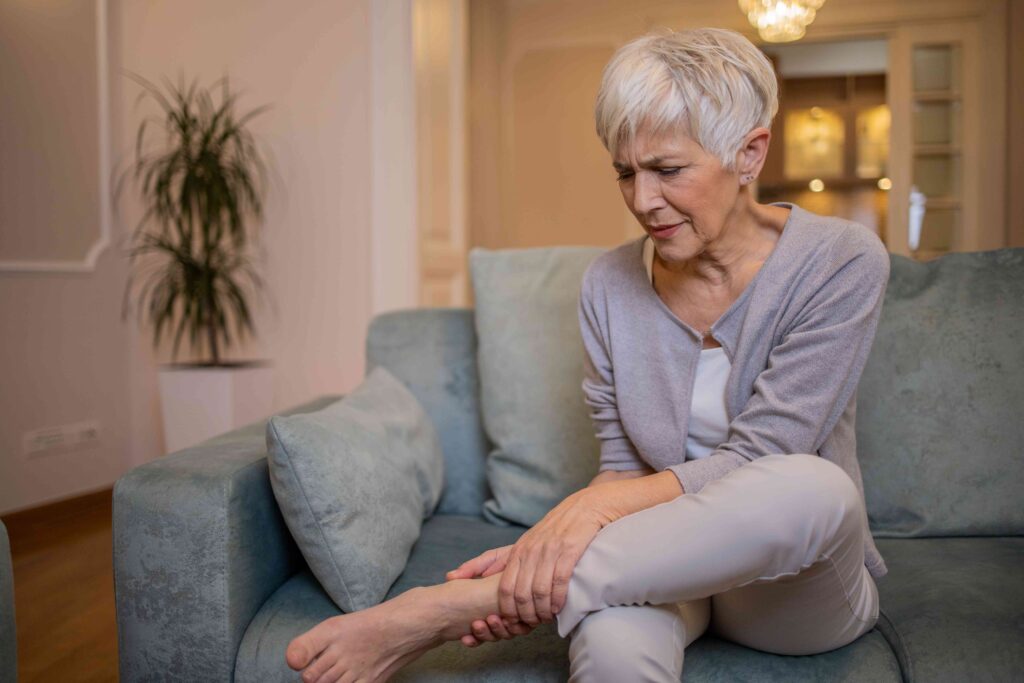:max_bytes(150000):strip_icc():format(jpeg)/health-GettyImages-1501022988-510ffaa244ba44b9917fd37096e7050c.jpg)
Congestive heart failure (CHF), often called heart failure, occurs when the heart is too weak to pump enough blood to the rest of the body. Damage to the heart muscle from a heart condition, chronic illness, or injury can cause CHF.
Heart failure can affect either side of the heart, preventing the heart from delivering oxygen-rich blood to other organs. This can result in symptoms such as shortness of breath, fatigue, swelling, and leg cramps.
Leg cramps are common, typically resulting from an involuntary tightening (contraction) of one or more muscles in the leg. Milder health concerns like muscle overuse or dehydration can cause leg cramps. Leg cramps may also be an early warning sign of congestive heart failure.
In people with CHF, the heart doesn’t pump blood with enough force. Not enough blood is pumped from the heart to the body with each heartbeat, leaving more blood in the heart than usual.
Blood pumped into the body has nowhere to go when it returns to the heart, which has not emptied properly. Blood flow slows down and can begin to back up in the blood vessels. This buildup of blood can also make it harder for the kidneys to expel waste fluid from the body.
The term “congestive” comes from the resulting buildup of blood and fluid. This buildup leads to swelling (edema), often in the lower legs, ankles, and feet. Swelling is a common early symptom of CHF, along with leg pain and weight gain. Looking out for these symptoms can help you catch CHF early.
When the vital organs don’t receive enough blood from the heart, the body will naturally send all possible blood there to keep them working. As a result, the leg muscles may not receive enough oxygen-rich blood, which can cause them to cramp up.
What about Nocturnal Leg Cramps?
Nocturnal leg cramps, or leg cramps that occur at night, are particularly common in people with heart failure. These cramps often affect your calf muscles.
The risk of both CHF and nocturnal leg cramps increases with age, meaning older people are more likely to have the conditions. Researchers are still trying to understand the exact cause of nocturnal leg cramps, but CHF (and other health conditions) can cause them.
While congestive heart failure is a common cause of leg cramps, other conditions can also lead to them. Simply overexercising a muscle or sweating heavily can cause leg cramps. In some cases, there is no detectable reason for these cramps.
Leg cramps can also be related to several serious medical conditions, such as the ones listed below.
Peripheral Artery Disease
Peripheral artery disease (PAD) is a heart condition that causes the arteries (blood vessels) to narrow. This reduces blood flow to the legs, which often leads to cramping. Cramps may occur during exercise or when walking but can subside while at rest. This type of cramping is called intermittent claudication.
Deep Vein Thrombosis
Deep vein thrombosis (DVT) refers to a blood clot that occurs inside a deep vein. This condition typically develops in the legs, and leg cramps are a common symptom. Blood clots in your legs are more likely to form when blood flow is slowed, such as in people with CHF.
Diabetes
Metabolic disorders like diabetes have also been linked to nocturnal leg cramps.
Diabetes is a common cause of peripheral neuropathy—a condition that damages the nerves outside the brain and spinal cord, affecting communication from the central nervous system to the rest of the body.
People with peripheral neuropathy may sustain damage to the motor, sensory, or autonomic nerves. Damaged motor nerves can cause leg pain that feels like muscle cramps. This pain can happen at any time, but it may be more common or worse at night.
Medications
Leg cramps can sometimes be a side effect of certain medications, particularly:
- Diuretics
- Beta-blockers
- Statins
- Angiotensin II receptor antagonists (ARBs)
- Inhaled long-acting beta-agonists (LABAs)
- Benzodiazepines
Healthcare providers prescribe many of these medications to treat heart conditions. People with heart failure often take diuretics, beta-blockers, or statins to help prevent the condition from progressing. As a result, heart disease medications may be another reason for leg cramps.
The best way to treat CHF-related leg cramps is to follow your heart failure treatment plan exactly as prescribed. Healthcare providers design these plans to treat the symptoms of CHF and slow its progression.
You can do a few things at home to treat leg cramps. Try these tips during an ongoing cramp:
- Stretch the muscle out and give it a gentle massage
- Walk around and shake out the muscle
- Elevate your legs by putting them up on a wall
- Apply warmth to the muscle with a heating pad, shower, or bath
- Take an ice bath if the muscle is sore after the cramp passes
To help prevent future leg cramps, you can:
- Try daily leg exercises to keep the muscles loose and increase blood flow
- Increase the amount of daily exercise you get
- Keep the bed sheets loose around your feet as you sleep so they do not force your feet to curl.
- Drink more water to stay hydrated
- Reduce your alcohol and caffeine intake
Leg cramps usually pass on their own and do not require a trip to a healthcare provider. If your leg cramps are suddenly more severe, happen more often, or occur alongside muscle weakness, it’s a good idea to tell your provider.
If you already have a heart failure diagnosis and notice new symptoms of CHF, like increased swelling or shortness of breath, visit your provider.
People with heart failure should monitor their weight to track fluid buildup and swelling. If you gain more than 2-3 pounds in 24 hours or more than five pounds in one week, call your provider or go to the emergency room right away for proper treatment.
Leg cramps are a common ailment that most people experience at one time or another. There can be many causes, and they usually pass on their own.
Leg cramps can be an early symptom of congestive heart failure when blood backs up into the blood vessels and can’t reach the leg muscles effectively. If you have leg cramps along with any other symptoms of CHF, make an appointment with your healthcare provider for diagnosis and treatment.













